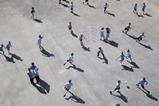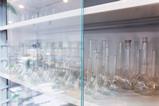Technicians telling it how it is: building great relationships between teachers, technicians and students makes for better science departments
When it comes to creating great relationships between technicians and teachers, it’s important to build trust from the start. It all comes down to mutual respect and appreciating the challenges in each other’s jobs. There’s no them and us. It’s not teachers versus technicians. Ultimately, we are both here to help the students learn.
Teachers aren’t ‘lazy’ or ‘disorganised’. On the contrary, they are overwhelmed. Hence I never like to say no to any requests and will go out of my way to make a practical happen. For my own benefit, I ask questions if there is a request I don’t understand. This helps me understand their challenges in class and for them to understand how much time it will take me to prepare or research something. Because we have this conversation, they know I am on their side as well as appreciating my difficulties and time constraints.
I used to be afraid to ask for help, but now I am more than happy to do so and this has contributed to creating a great bond with the whole science department.
Honesty is key to creating ideal relationships in a department. Be honest and upfront. If you’re unhappy about anything, speak up, work through the issues, don’t just bury them.
When reactions go badly – initially
After my first week at school, in fact my first week as a technician, I emailed the staff to explain that if I sometimes seem different or rude, it’s because I suffer from Asperger’s, a form of autism. The teachers said I was brave in sharing this so early, and my honesty initially helped to create good relationships with them. Unfortunately, not everyone seemed to understand. Thankfully when a new head of department arrived, the whole department improved and my situation improved too.
Student relations
To build respectful relationships with students, technicians rely on the teachers and the school system. We need teachers to acknowledge the work we have done to prepare a practical and tidy up afterwards. For example, in a metal ions identification practical, each working pair will have a few solutions to work with. When the teacher tells the students to empty out the solid wastes and rinse out their glassware, they can add how much work it will otherwise be for us to empty out 50 boiling tubes, or, scrub out the stains of all these tubes. If teachers make these kinds of comments in every practical lessons, the students will be aware of our existence and the role we play in their education. When teachers show their appreciation of our work, the students pick up that respect.
Taking on lunch and break time playground duties offers another useful opportunity for us to create a rapport with students. Although these duties can interfere with our practical preparation and delivery, they can usually be fitted in a couple of times a week – and thatʼs enough to make a difference.
My proudest moment …
-
When students comes into the prep room, whether it’s to drop something off or have a quiet place to catch up on an assessment, they struggle to contain their excitement and fascination at the plethora of equipment in my room.

- Starting my third year as a school science technician. I started my technician’s career as an apprentice, without much guidance in school. Apart from the odd thing, much of what I’ve learned has been self-taught.
- When students come to me starry-eyed, with a question or two, after finding out from teachers I have a doctorate. I always walk away from these conversations with a feeling that I might have inspired the next generation.











3 readers' comments